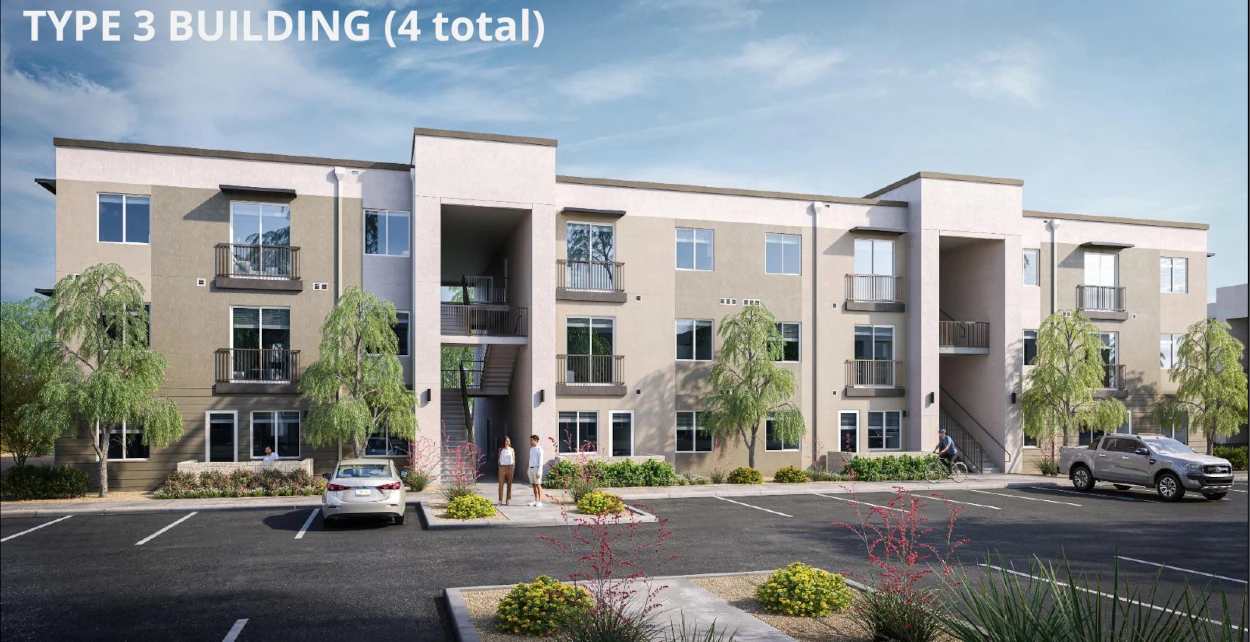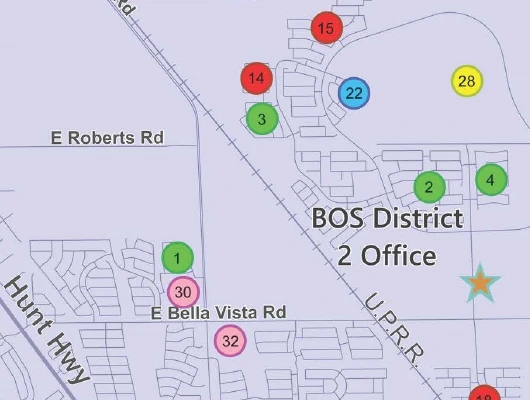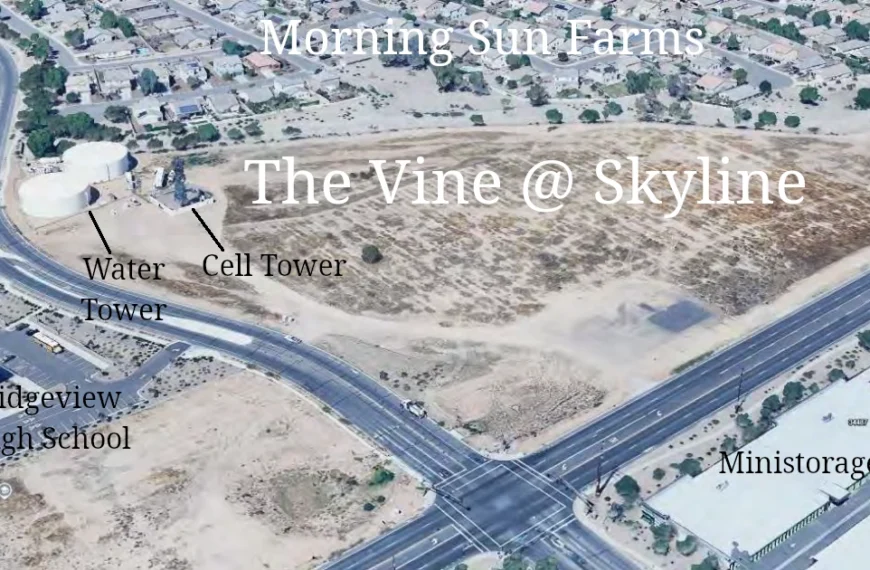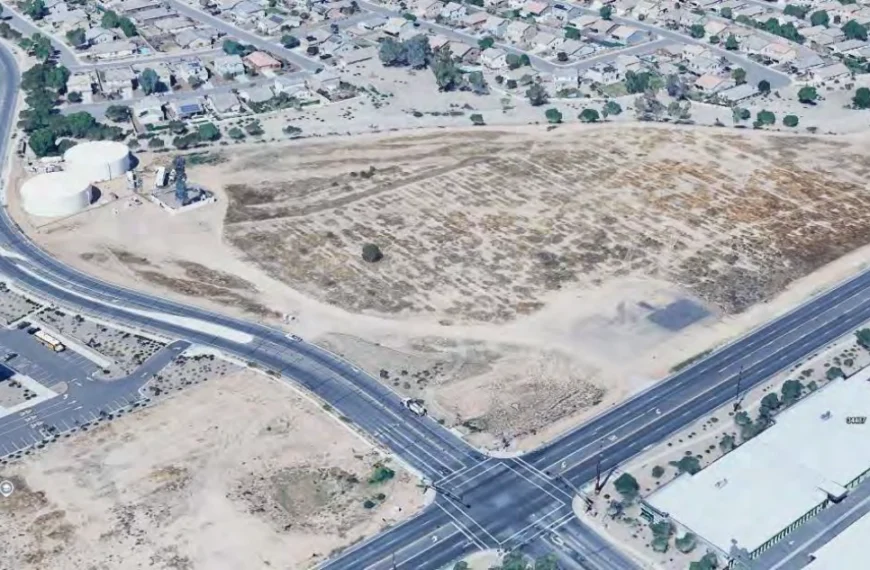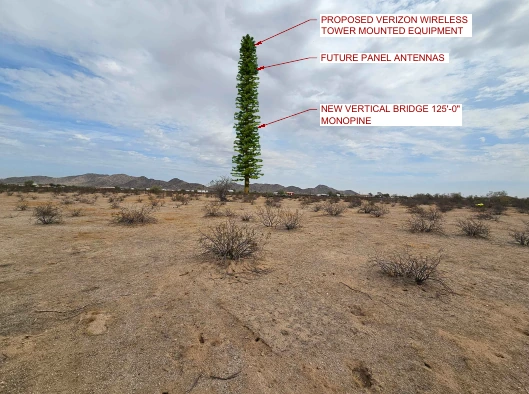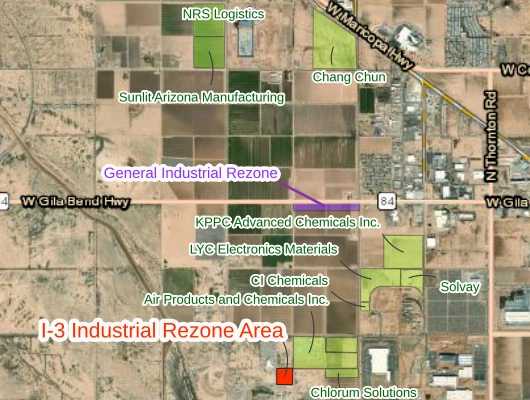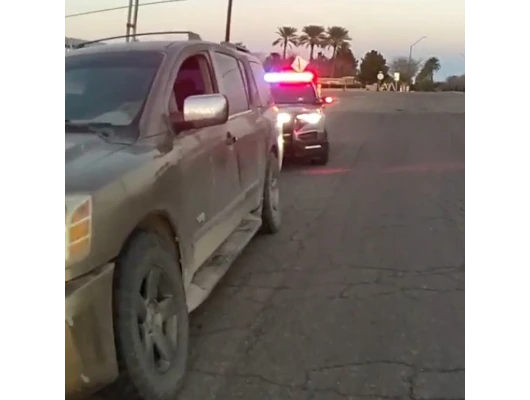Developer overcomes Planning Commission denial to secure approval for downtown residential project
The Apache Junction City Council voted 7-0 on June 17th to approve a controversial 336-unit “Apache Trail & Plaza” apartment complex after hearing hours of passionate testimony from residents and business owners on both sides of the issue.
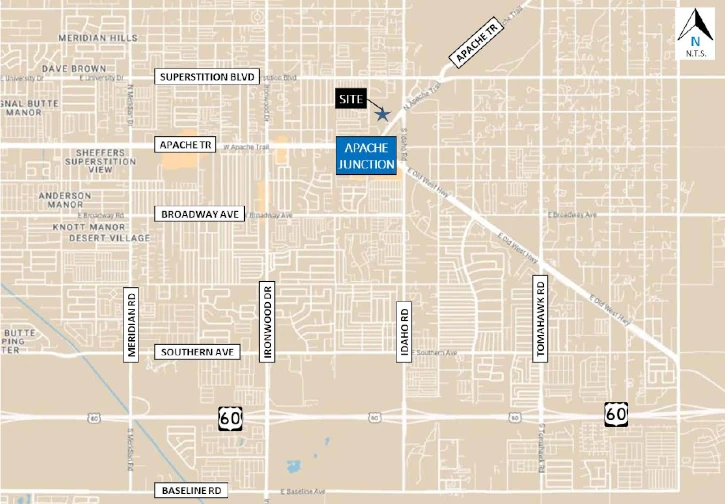
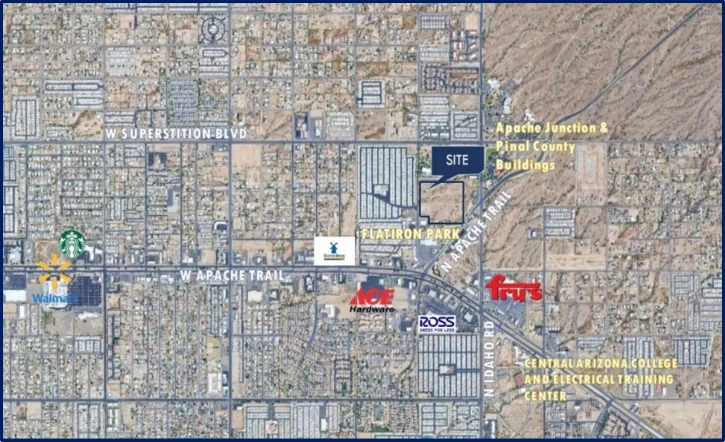
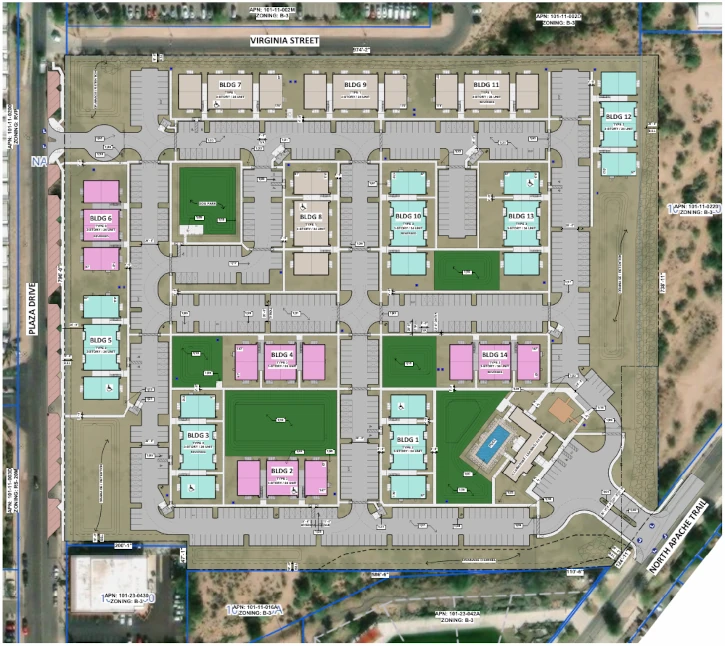
Appeal Process and Previous Rejection
The Wolff Company’s proposal had faced rejection from the Planning and Zoning Commission on April 8, 2025 (Case P-24-104-CUP), by a 5-2 vote to deny the request. The commission members who voted against the project expressed concerns about increased traffic along Plaza Drive and Apache Trail, particularly during local events, and objected to developing the property for residential use instead of commercial.
Developer representative Paul Gilbert filed an appeal on April 24, bringing the matter before the city council. Gilbert argued the Planning Commission overlooked traffic studies and ignored the project’s alignment with the city’s General Plan.
Updated Presentation Elements
Since the Planning Commission hearing, the applicant made several changes to address concerns. The development team updated their traffic impact analysis to account for seasonal variations after their traffic engineer compared September 2024 traffic counts with available data from the city, ADOT, and the Maricopa Association of Governments (MAG). The engineer’s analysis found an approximate 32% difference between peak and non-peak seasons.
The applicant also shifted the secondary entrance further north along Plaza Drive to reduce potential conflicts with the Lost Dutchman RV Resort entrance and added a pedestrian access point to improve walkability.
Following the appeal, the developer held an additional business community outreach meeting on May 12, with 15 business representatives attending to show support for the project.
RV Park Residents’ Opposition
The council chamber was packed for the hearing, with residents and business owners on both sides of the issue. Several residents from the Lost Dutchman RV Resort across Plaza Drive voiced strong opposition to the development.
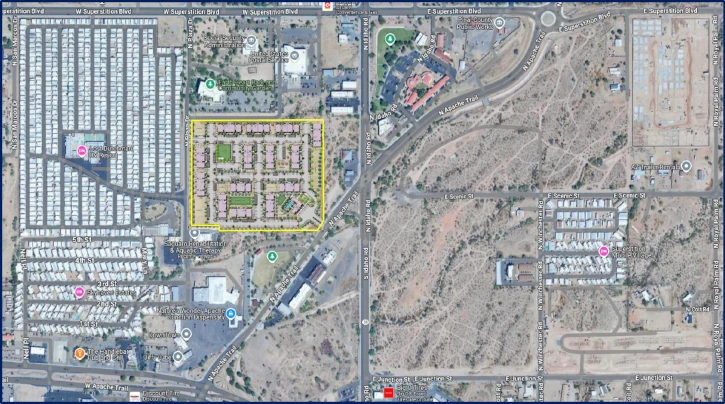
Bruce Evans, a Lost Dutchman resident, complained about the timing, noting that many seasonal residents had already returned north for the summer: “Just about all of our residents are already back at their other house for the summer. So, it was already voted five to two against. Now that they’re gone, it’s like everyone is trying to get in the back door.”
Residents cited concerns about blocked mountain views, increased traffic congestion, and infrastructure strain. “I moved there because we’ve lived in Arizona most of my life. Superstitions has always been and always will be my favorite mountain. They’re gonna block it off,” Evans said.
Gordon Lundholm questioned the parking calculations, arguing that families with teenagers would need more than the proposed two parking spaces per unit. “You have the parents’ cars, because everybody drives. There’s no public transport. Kids, as soon as they can drive, they get a car. You got two teenagers and your parents, all of a sudden you’ve got four cars, and they only have two spots per unit.”
Lundholm also raised concerns about overcrowding, asking the council: “Do you have any limitations as to the number of people that can live in an apartment? Because I know of issues where you have had a three-bedroom apartment with too many people in it. We had an issue in our complex. A three-bedroom townhome had 20 people in it, six vehicles.”
Residents also expressed frustration that the developer plans to charge premium rent for units with mountain views while blocking theirs. Several speakers complained about existing infrastructure problems, including low water pressure and electrical issues that they feared would worsen with additional residents.
Brenda Adams, manager at Lost Dutchman RV Resort, told the council: “We have 1,400 very unhappy residents.” She suggested that if the city prioritized the development over existing residents’ concerns, RV park residents might choose to shop elsewhere: “If it’s gonna be an issue where you are not pleased with us and wanna take away from us, it’s just as easy for us to go to Mesa and get good shopping.”
Business Community Support
Multiple business owners testified in favor of the development, emphasizing how year-round residents would help sustain their operations during summer months when seasonal visitors leave.
Angela Kapfer, owner of Coffee Corner at 300 West Apache Trail, said: “For a small business, an apartment complex in Apache Junction would bring tremendous benefits for me and the community. I love this community, and we’ve been profoundly affected by the winter visitors leaving. So much so that I’ve gone back to work, and I have my right-hand person take care of my business. I do hope that we can sustain during the summer. And I think this would be a huge benefit for not only my business, but every surrounding business.”
Rick Slayton from Paladino’s Italian Eatery stated in a letter to the council: “The two biggest challenges we face in the business community. The first challenge is the workforce pool. The second challenge is year-round residents. This project and projects like it address both issues head on.”
Claire Lansing, administrator at Saguaro Fitness and Rehabilitation, said some of her clients “can’t even drive, and they have a hell of a time trying to get to our facility. This could be a great place for them to rent nearby.”
Dennis Polzak, manager of the Handlebar Pub & Grill, explained: “We do a third in the summer what we do in the wintertime. Trying to keep a staff to feed their families, to support themselves, requires some very difficult decisions to keep food on their table when you have such a swing of things.”
Dawn Cottrell, chief operations officer at Horizon Health and Wellness, testified: “We face significant challenges filling our vacant positions. Although we’re committed to hiring within the communities we serve, there’s limited number of applicants from the City of Apache Junction.”
Todd and Stacy Kidwell, who operate Apache Korners convenience store adjacent to the property, stated in a letter: “We are strongly in favor of this residential development. This will bring more year round residents that will help support our neighborhood store.”
Colleen Compose, a small local business owner for almost 30 years, said: “We’ve learned in our 30 years that Apache Junction cannot sustain my small business. We are fortunate in that we are mobile and we can do such a thing. However, many other companies, small and local, cannot.”
Mary Ann Przybylski, president and CEO of the Apache Junction Area Chamber of Commerce, formally expressed the chamber’s strong support, stating: “Local businesses across all sectors consistently cite the limited availability of quality attainable housing as a growing barrier to hiring and retaining employees.”
Emma Reyes, representing Republic Services and speaking on behalf of the Apache Junction chamber board, also expressed support for the project.
Zoning and General Plan Alignment
The approximately 18.5-acre property sits in the B-3 City Center zoning district with a Downtown Mixed Use general plan designation. Multi-family residential requires a conditional use permit in this zone, while retail and office uses are permitted by right.
Principal Planner Kelsey Schattnik explained that the proposed use aligns with the voter-approved General Plan, which encourages “a mix of retail, office and multi-family uses” in the downtown area. The project requires no General Plan amendment.
Gilbert emphasized the project’s consistency with city planning documents: “Your general plan encourages this high density multi-family in the downtown area.” He cited General Plan Goal 11.3, which states: “Provide high-density, multifamily housing within the downtown area.”
Downtown Development Context
The apartment complex sits approximately 1,000 feet from the Golden Triangle property, the former Grand Hotel site the city purchased in May 2024 for downtown economic development. The Concentrated Downtown Master Plan designates the apartment site as “Future Residential.”
“For any successful downtown mixed-use core to be successful, there must be adjacent residential that helps support the commercial activities,” Gilbert quoted from the downtown plan.
The development supports the city’s vision for a walkable downtown core that can sustain both existing and future commercial development.
Project Economics and Infrastructure
Gilbert detailed the project’s economic impact: “This is an $80 million project that we’re proposing to bring to Apache Junction, and we will be investing $7.3 million into public infrastructure.”
According to Gilbert, this includes $1 million in developer-installed improvements and $2.7 million in impact fees to the city, broken down as $607,000 for streets, $450,000 for parks, $324,000 for police, $145,000 for library, $100,000 for public art, and $1.1 million for water and sewer, with additional municipal revenue from $667,000 in plan check and permit fees and $3.4 million in construction sales tax.
An economic study by Elliott D. Pollack & Company projects residents will generate $6.8 million in annual retail spending, supporting approximately 15,600 square feet of retail space. Gilbert also stated that the development would create at least $100,000 in annual sales tax revenue for the city.
Utility Infrastructure Concerns
Mayor Chip Wilson addressed water pressure and electrical concerns raised by RV park residents. He reported that Arizona Water tested the connection to Lost Dutchman and found over 100 PSI pressure delivered, but the park’s equipment reduces it to 40 PSI internally.
“That is a problem with the park. It is not a problem with the water delivery from Arizona Water,” Wilson explained. Councilmember Darryl Cross provided additional technical context: “The pressure gets reduced down to 40 psi, and that’s to save the plumbing within your buildings, within your homes. Those buildings aren’t designed for 100 psi. And I would imagine a lot of them, or several of them, have probably the old polybutylene gray pipe. And you start putting pressure on that, and… you’re gonna have leaks everywhere.”
According to materials provided to the council, SRP confirmed adequate electrical capacity exists for the proposed development and found no issues with power delivery to the RV park.
Housing Market Analysis
Gilbert distinguished the project from other housing types: “These are market rate non-age-restricted multifamily units.” He clarified they are not government-sponsored affordable housing but are “less expensive than what you know commonly as a build-to-rent project.”
The development addresses a critical gap in Apache Junction’s housing stock. According to the applicant citing the General Plan, multi-family housing represents only 5% of available housing in the city, compared to higher percentages in surrounding communities like Queen Creek, Chandler, Gilbert, and Mesa.
Traffic and Parking Considerations
Gilbert’s traffic study showed the development would generate 2,265 daily vehicle trips. He compared this to hypothetical scenarios for other allowable uses on the same property: a shopping center would generate 14,952 daily trips while an office development would produce 3,910 daily trips.
The applicant requested an 8.7% parking reduction, providing 684 on-site spaces instead of the required 729, while adding 45 public parking spaces along Plaza Drive. Staff supported the reduction based on a parking study and available public parking.
Council Deliberations
Councilmember Darryl Cross initially proposed requiring the developer to reorient two westernmost buildings from north-south to east-west alignment to preserve mountain view corridors, citing the downtown master plan’s directive to “preserve key view corridors while respecting the rights of adjacent property owners.”
However, Gilbert responded that drainage, parking, and other technical issues would make the project unfeasible with such changes: “We cannot accept that proposal.”
Cross withdrew his motion after the developer’s response, though he expressed hope the developer might still consider some form of view corridor for the park.
Councilmember Peter Heck emphasized the need for age diversity in the community: “We absolutely need to have younger families that are coming into this community.” He noted that Apache Junction High School’s enrollment has dropped from just about 9,000 students at its peak to less than 3,000 currently.
Councilmember Bryan Soller stressed the need to support local businesses: “We gotta grow our businesses, our restaurants, our bars. We gotta help them during the eight months that no one’s here.”
Final Approval Conditions
The council added a condition requiring the apartment manager to participate in the Apache Junction Crime-Free Multi-Housing Program and provide proof of participation to the Development Services Department on the anniversary of the grand opening each year. Soller explained: “What that does is it gives the manager of the complex the capability of removing problems. If the police show up and report it to management, they need to deal with it.”
The final unanimous vote came after council members emphasized the project’s alignment with voter-approved plans and the need to support year-round businesses while providing housing options for young families and workers.
The developer indicated construction was anticipated to start in December 2025, with first buildings opening in the second quarter of 2027 and final completion in the first quarter of 2028.
